- Home
- Juliet Marillier
Son of the Shadows Page 4
Son of the Shadows Read online
Page 4
“Aengus was dying; his body was burning up, his heart beat like a battle drum, his eyes were hot with fever. And so the Dagda solicited the help of the king of Munster. They sought to the east, and they sought to the west, and along all the highways and byways of Erin; and at length they learned the maiden’s name. It was Caer Ibormeith, Yewberry, and she was the daughter of Eathal, a lord of the Tuatha Dé, who dwelt in an Otherworld place in the province of Connacht.
“When they told Aengus this news, he rose up from his sickbed and went forth to find her. He made the long journey to the place called Mouth of the Dragon, the lake on whose remote shores he had first glimpsed his beloved. He waited there three days and three nights, taking neither food nor drink, and at length she came, walking along the sand barefoot as he had seen her in his vision, her long hair whipped around her by the wind over the lake, like coils of living fire. His desire threatened to overwhelm him, but he managed to approach her politely and introduced himself as steadily as he could.
“The maiden, Caer Ibormeith, wore around her neck a collar of silver, and now he saw that a chain linked her to another maiden, and another, and all along the shore thrice fifty young women walked, each joined to the next by chains of wrought silver. But when Aengus asked Caer to be his, when he pleaded his longing for her, she slipped away as silently as she had appeared, and her maidens with her. And of them all, she was the tallest and the most lovely. She was indeed the woman of his heart.”
He paused, but not a glance did he make in Niamh’s direction, where she sat like some beautiful statue, her intense blue eyes full of wonderment. I had never seen her sit still so long.
“After this, the Dagda went to Caer’s father where he dwelt in Connacht and demanded the truth. How could his son, Aengus, win this woman, for without her he would surely be unable to live? How might so strange a creature be had? Eathal was unwilling to cooperate; eventually, pressure was applied that he could not resist. The fair Caer, said her father, chose to spend every other year as a swan. From Samhain she would resume her birdlike guise; and on the day she changed, Aengus must take her to him, for that was the time she was most vulnerable. But he must be ready, warned Eathal. Winning her would not be without a cost.
“It came to pass as Eathal had said. On Samhain Eve, Aengus traveled back to the Dragon’s Mouth, and there on the shore were thrice fifty beautiful swans, each with a collar of beaten silver. Thrice fifty and one, for he knew the swan with the proudest plumage, and the longest, most graceful neck, was his lovely Caer Ibormeith. Aengus went up to her, and fell on his knees before her, and she laid her neck across his shoulder and raised her wide wings. At that moment he felt himself changing. A thrill went through his body, from the tips of his toes to the hair on his head, from his smallest finger to his beating heart; and then he saw his skin change and shimmer and his arms sprout forth snowy plumes, and his vision became clear and far seeing, and he knew he, too, was a swan.
“They flew three times around the lake, singing in their joy, and so sweet was that song that it lulled all for many leagues around into a peaceful sleep. After that, Caer Ibormeith returned home with Aengus, and whether they went in the form of man and woman, or of two swans, the stories do not make plain. But they do say, if on Samhain Eve you travel close to Loch Béal Dragan and stand very still on the shore at dusk, you will hear the sound of their voices calling out in the darkness over the lake. Once you have heard that song, you will never forget it. Not in all your living days.”
The silence that followed was a sign of respect accorded only to the best storytellers. He had indeed told his tale with skill; almost as well as one of our own family might have done. I did not look at Niamh; I hoped her red cheeks would not draw undue attention. At length it was my mother who spoke.
“Come forward, young man,” she said softly, and she stood up, but her hand was still in my father’s. The young druid stepped forward, somewhat paler in the face than before. Perhaps, for all his seeming confidence, this had been an ordeal for him. He was young enough, scarce twenty, I’d have thought.
“You tell your tale with spirit and imagination. Thank you for entertaining us so well tonight.” She smiled at him kindly, but I noticed the grip she kept on Iubdan’s fingers behind her back, as if to steady herself.
The young man bowed his head briefly. “Thank you, my lady. Praise such as this, coming from a storyteller of your reputation, I value highly. I owe my skills to the best of teachers.” He glanced at Conor.
“What is your name, son?” This was Liam, from across the room where he sat among his men. The boy turned.
“Ciarán, my lord.”
Liam nodded. “You are welcome in my house, Ciarán, whenever my brother chooses to bring you here. We value our tales and our music, which once were all but lost from these halls. Welcome, indeed, all of the brotherhood and sisterhood who grace our fireside on Brighid’s night. Now, who will play the harp or flute or sing us a fine song of battles won and lost?”
My uncle was, I thought, deliberately moving them onto safer territory, like the master tactician he was. The young man, Ciarán, melted back into the group of gray-robed figures seated quietly together in a corner; and with the passing around of mead jugs and the striking up of pipes and flute, the evening went on in perfect harmony.
After a while, I told myself I was being foolish. An overactive imagination, that was all it was. It was natural for Niamh to flirt; she did it without thinking. There was no real intention in it. There she was now, laughing and joking with a couple of Liam’s young warriors. As for the tale, it was not uncommon to base a description of a hero, or a lady, on someone you knew. A boy brought up in the sacred groves, far from the halls of lord and chieftain, might have precious little to go on when required to speak of a peerless beauty. Not surprising, then, that he fixed on the lovely daughter of the house as his model. Harmless. I was stupid. The druids would go back to their forest, and Eamonn would return, and he would marry Niamh, and all would be as it should be. As it must be. I’d almost convinced myself, as it drew onto midnight and we made ready to retire to bed. Almost. As I reached the foot of the stairs, candle in hand, I happened to glance across the room, and met the steady gaze of my Uncle Conor. He was standing still amid a bustle of people who talked, and laughed, and lit candles from the lamp there, so still he could have been made of stone, but for his eyes,
Remember, Liadan. It unfolds as it must. Follow your path with courage. That is all any of us can do.
But—but—
He had moved away already, and I could no longer touch his thoughts. But I saw Sean turn his head sharply toward me, feeling my confusion without understanding it. It was too much. Nameless feelings of ill; sudden bouts of shivering; cryptic warnings of the mind. I wanted my quiet room, a drink of water, and a good night’s sleep. Simple, safe things. I gripped my candleholder, picked up my skirts, and went upstairs to bed.
Chapter Two
It’s quite tricky making a tincture of celandine. The method is simple enough; it’s getting the quantities just right that’s the problem. My mother showed me how to do it both ways, with fresh leaves and dry, her small, capable hands grinding the dried leaves with mortar and pestle while I shredded the newly gathered ones, placing them in a shallow bowl, covering them barely with a little of the precious brew that was the same Conor had used to bring down the blessing of Brighid on our fields this growing season. I followed her instructions, glad I was not one of those who suffered a painful swelling of the skin when working with this particular herb. My mother’s hands were smooth and pale, for all her daily labors in the stillroom, and delicately made. The only adornment she wore was the ring her husband had crafted for her many long years ago. Today, she was clad in an ancient gown that had once been blue, and her long hair was tied back with a plain strip of linen. This gown, this ring, these hands each had their own tale; and my mind was on them as I prepared my own bowl of steeping herbs.
“Good,” said Mothe
r, watching me. “I want you to learn this well and be able to apply it with other materials as aptly. This tincture will ease most maladies of the stomach, but it is strong. Use it on your patient but once, or you may do more harm than good. Now lay the muslin cloth over your bowl and put it away carefully. That’s it. One and twenty nights let it rest, and then strain it and store it in the dark, corked tight. Such a tincture will keep well for many moons. This will see you through the winter.”
“Why don’t you sit down for a while, Mother?” The pot was boiling on the small fire; I took down two earthenware cups, opened jars of dried leaves.
“You’re spoiling me, Liadan,” she said, smiling, but she did sit down, a slight figure in her old, working dress. The sun streamed in the window behind her, showing me how pale she was. In the strong light, you could see the traces of faded embroidery at the neckline and hem of her gown. Ivy leaves, little flowers, here and there a tiny, winged insect. I poured hot water carefully into each cup.
“Is this a new mixture?”
“It is,” I said, beginning to clean and tidy away the knives and bowls and implements we had used. “See if you can tell me what’s in it.” The smell of the herbal infusion was spreading through the cool, dry air of the stillroom.
Mother sniffed delicately. “There’s all-heal—the dried flowers, that must be; there’s figwort in it, maybe a touch of Saint-John’s-wort as well, and—goldenwood?”
I found a jar of our best honey and spooned a little into each cup. “You certainly haven’t lost your touch,” I said. “You needn’t worry. I know how to gather that herb and how to use it.”
“A powerful combination, Daughter.”
I glanced at her, and she looked straight back.
“You know, don’t you?” she said softly.
I nodded, unable to speak. I placed a cup of the healing tea on the stone sill beside her and my own near me where I worked.
“Your choice of herbs is very apt. But it is too late for such cures to do more than provide a brief respite. You know this too.” She took a sip of the tea, screwed up her face, and gave a little smile. “It’s a bitter brew.”
“Bitter indeed,” I said, sipping my own tea, which was plain peppermint. I managed to keep my voice under control, just.
“I can see we have taught you well, Liadan,” said my mother, regarding me closely. “You have my skill with healing and your father’s gift for love. He gathers all around him under his protective shade like a great forest tree. I see the same strength in you, Daughter.”
This time, I did not risk speaking.
“It will be hard for him,” she went on, “very hard. He is not one of us, not truly, though we forget it sometimes. He does not understand that this is not a true parting but simply a moving on, a changing.”
“The wheel turns and returns,” I said.
Mother smiled again. She had put the tea down almost untouched. “There’s a bit of Conor in you as well,” she said. “Sit down awhile, Liadan. I have something to tell you.”
“You too?” I managed a watery grin.
“Yes, your father told me about Eamonn.”
“And what did you think?”
A little frown creased her brow. “I don’t know,” she said slowly. “I can’t advise you. But—but I would say, don’t be in too much of a hurry. You’ll be needed here for a while.”
I didn’t ask her why. “Have you told Father?” I asked finally.
Mother gave a sigh. “No. He will not ask me, since he knows I will answer with the truth. I don’t need to put it into words. Not for Red. His knowledge is there in the touch of his hand, in his hastening home from plowing, in the way he sits by the bed, thinking me asleep, and holds my hand, looking into the darkness. He knows.”
I shivered. “What was it you were going to tell me?”
“Something I have never shared with anyone. But I think now is the time to pass it on. You’ve been troubled lately; I’ve seen it in your eyes. Not just—not just this, but something more.”
I held my cup between my palms, warming them. “I get—sometimes I get the strangest feeling. As if suddenly everything goes cold, and—and there’s a voice …”
“Go on.”
“I see—I feel as if something terrible is coming. I look at someone and sense a—a sort of doom over them. Conor knows. He told me not to feel guilty. I didn’t find that particularly helpful.”
Mother nodded. “My brother was about your age when he first felt it. Finbar, I mean. Conor remembers that. It is a painful skill, one few would wish for themselves.”
“What is it?” I asked, shivering. “Is it the Sight? Then why don’t I go into convulsions and scream and then go limp like Biddy O’Neill down at the Crossing? She’s got the Sight. She foretold the great floods two winters ago and the death of that man whose cart went over the edge at Fergal’s Bluff. This is—different.”
“Different but the same. The way it takes you depends on your own strength and your own gifts. And what you see can also mislead you. Finbar often saw true, and he felt the guilt of not being able to prevent the things from happening. But what his visions meant was by no means easy to interpret. It’s a cruel gift, Liadan. With it comes another, which you have not yet had cause to develop.”
“What’s that?” I wasn’t sure I wanted to know. Wasn’t one such gift, if gift it could be called, more than enough?
“I can’t explain it, not fully. He used it on me once. He and I—he and I shared the same bond you have with Sean, a closeness that lets you speak mind to mind, that tunes you to the other’s inmost self. Finbar had greater skill than I; those last days he became adept at keeping me out. There were times when I think he dreaded to let down his guard; he had a wound deep to the spirit, and he would not share it, not even with me. But he had the other skill as well, the ability to use the power of his mind for healing. When I was—when I was hurt and thought the world would never be right again, he—he touched me with his mind; he blocked out the bad things; he held my thoughts with his own until the night was over. Later, he used this same skill on my father, whose mind was deeply damaged by the work of the Sorceress, the Lady Oonagh. She kept Father dancing to her will for three long years while my brothers were under the enchantment. And Lord Colum was not a weak man; he wrestled with his own guilt and shame, and yet he could not deny her. When we returned home at last, he scarcely knew us. Bringing him back to himself took many patient days and nights. There is a heavy price for the use of this healing power. Afterward Finbar was—drained, scarce himself. He was like a man who has undergone the fiercest ordeals of body and spirit. Only the strongest may withstand this.”
I looked af her with a question in my eyes.
“You are strong, Liadan. I cannot tell you if and when you may be called to use this gift. Perhaps never. It’s best you know, at least. He would be able to tell you more.”
“He? You mean—Finbar?” Now we were on fragile ground indeed.
Mother turned to look out of the window. “It grew again so beautifully,” she said. “The little oak Red planted for me that will one day be tall and noble, the lilac, the healing herbs. The Sorceress could not destroy us. Together, we were too strong for her.” She looked back at me. “The magic is powerful in you, Liadan. And there is one more thing in your favor.”
“What’s that?” I asked. Her words were both fascinating and terrifying.
“He showed me once; Finbar. I came close to asking him what the future would hold for me. He showed me a moment of time. There was Niamh, dancing along a forest path with her hair like golden fire, a child with a gift for happiness. And Sean, running, running to catch up with her. I saw my children and Red’s. And—and there was another child. A child who was—shut out. On the edge, so that I could never quite see. But that child was not you, Daughter. Of that I am certain. Had it been you, I would have known the moment you were born and laid in my arms.”
“But—but why wasn’t I there? Sean and I are
of an age. Why would I not be in your vision, too?”
“I saw the same vision earlier,” said my mother slowly. “When I—but both times, you were not there. Only that other child, closed off from the picture. I believe you are somehow outside the pattern, Liadan. If this is so, it could give you great power, dangerous power. It could allow you to—change things. In these visions, it was not foretold that Sean’s birth would bring forth a second child. That sets you apart. I have believed, for a long time, that the Fair Folk guide our steps. That they work their great plans through us. But you are not in their scheme. Perhaps you hold some sort of key.”
It was too much to take in. Still, I could not but believe her, for my mother always told the truth, no more and no less.
“Then what about the third child in the vision?” I asked. “The child on the margin, in the shadows?”
“I cannot tell who that was. Only—it was a child who had given up all hope. That is a terrible thing. Why I was shown this, there is no telling. In time, perhaps you will find out.”
I shivered again. “I’m not sure that I want to.”
Mother smiled and got up. “These things have a habit of finding you, whether you like it or not,” she said. “Conor was right. There’s no point in feeling guilty or worrying about what may come. Put one foot before the other and follow your path. That’s all we can do.”
“Hmm.” I glanced at her. It sounded as if my own particular path might be rather more complicated than I would have wished. I didn’t ask for much. The security and peace of Sevenwaters, the chance to use my craft well and be warmed by the love of my family. I wasn’t sure if I had it in me to do more than that. I could not see myself as one who might influence the course of destiny. How Sean would laugh at this notion, if I told him.

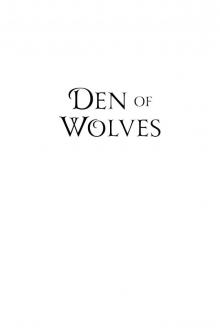 Den of Wolves
Den of Wolves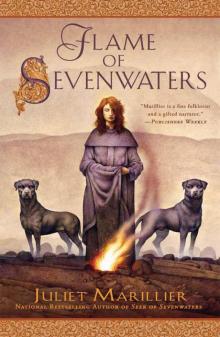 Flame of Sevenwaters
Flame of Sevenwaters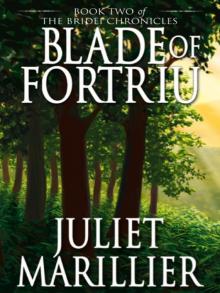 Blade of Fortriu
Blade of Fortriu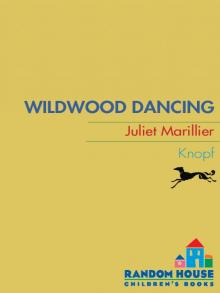 Wildwood Dancing
Wildwood Dancing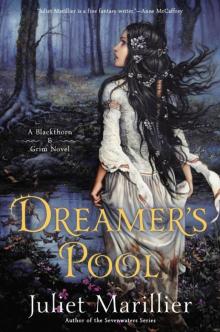 Dreamer's Pool
Dreamer's Pool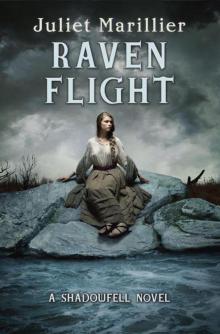 Raven Flight
Raven Flight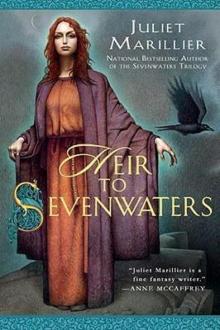 Heir to Sevenwaters
Heir to Sevenwaters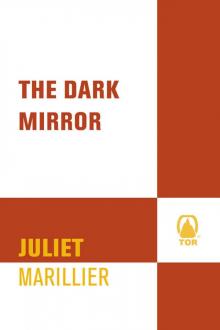 The Dark Mirror
The Dark Mirror Daughter of the Forest
Daughter of the Forest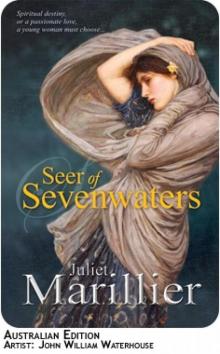 Seer of Sevenwaters
Seer of Sevenwaters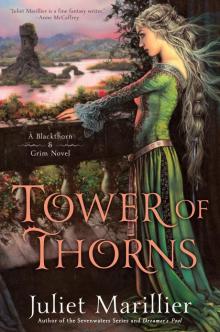 Tower of Thorns
Tower of Thorns Shadowfell
Shadowfell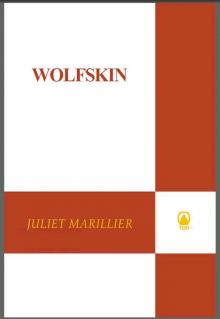 Wolfskin
Wolfskin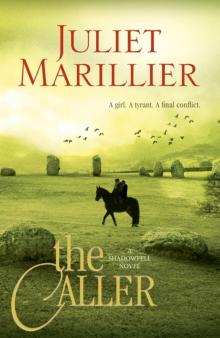 The Caller
The Caller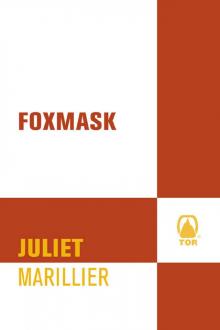 Foxmask
Foxmask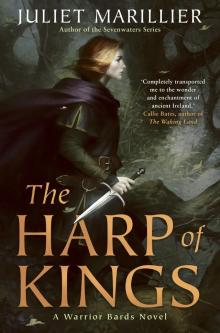 Harp of Kings
Harp of Kings The Well of Shades
The Well of Shades Heart's Blood
Heart's Blood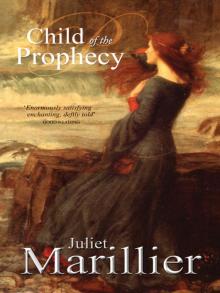 Child of the Prophecy
Child of the Prophecy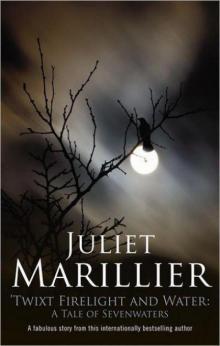 Twixt Firelight and Water
Twixt Firelight and Water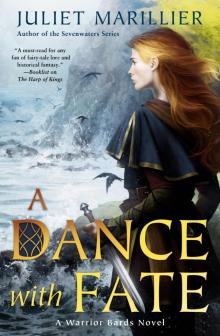 A Dance with Fate
A Dance with Fate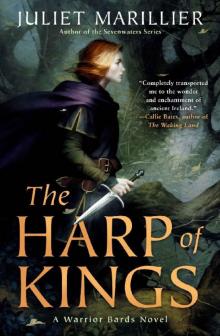 The Harp of Kings (Warrior Bards)
The Harp of Kings (Warrior Bards)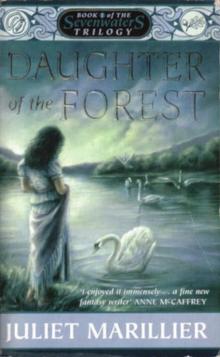 Daughter of the Forest (The Sevenwaters Trilogy)
Daughter of the Forest (The Sevenwaters Trilogy)![Sevenwaters [06] Flame of Sevenwaters Read online](http://i1.bookreadfree.com/i2/04/08/sevenwaters_06_flame_of_sevenwaters_preview.jpg) Sevenwaters [06] Flame of Sevenwaters
Sevenwaters [06] Flame of Sevenwaters![[Sevenwaters 04] Heir to Sevenwaters Read online](http://i1.bookreadfree.com/i2/04/12/sevenwaters_04_heir_to_sevenwaters_preview.jpg) [Sevenwaters 04] Heir to Sevenwaters
[Sevenwaters 04] Heir to Sevenwaters